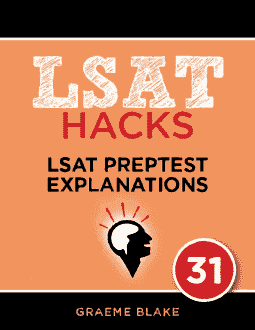QUESTION TEXT: Historian: Leibniz, the seventeenth-century philosopher, published…
QUESTION TYPE: Necessary Assumption
CONCLUSION: Leibniz and Newton each independently discovered calculus.
REASONING: Newton had been working with calculus for a decade before Leibniz published his results. Meanwhile Newton could not have influenced Leibniz.
ANALYSIS: The argument is assuming that no one else discovered calculus and influenced both Leibniz and Newton.
___________
- If Leibniz had told his wife it wouldn’t really affect the argument.
- This could have happened if the third source did not influence Newton or Leibniz. (suppose the third person lived far away in China.)
- The argument makes no claims about what Newton believed.
- They could each have known yet still discovered calculus independently.
- CORRECT. It’s hard to say they discovered it if some third source told them crucial details.


But E doesn’t give a time period such as the other answer choices. How does the argument require the fact that they didn’t learn crucial details about calculus from a third source, if they could have done so AFTER the discovery.
The wording “crucial details” doesn’t necessarily have to predate discovery, especially not in mathematics. This answer choice would had to have used terms such as “crucial details for discovery” or “prior to their discovery”, to indicate a correct answer choice. No?
It’s not clear why C isn’t the answer when the author states two things:
1. Newton revealed that he has been using these ideas for at least a decade
2. Newton claimed that he had disclosed these ideas in a letter shortly before Leibniz’s publication
Newton’s claim implies that he believed that Leibniz was able to learn something.
Not necessarily. You shouldn’t focus on a timeframe outside of the stimulus because the argument is limited to the information provided (i.e. a decade before the discovery and the events surrounding the discovery). If you’re saying “Person A and Person B didn’t teach each other X, so they must have discovered X independently”, you’re also assuming that no third person (Person C) taught them X.
It’s like saying two students got the same answer on a test, and you know they didn’t cheat off each other, so you conclude they figured it out on their own. But for that conclusion to work, you also have to assume they didn’t both get the answer from a third student/person. You don’t need to specify that this assumption applies during the test; that’s implied because the discussion is only about the test.
There are multiple issues with C:
1. The argument doesn’t make any claims about what Newton believed; he claimed to have disclosed his ideas to Leibniz, but that doesn’t require the assumption that Leibniz actually learned something important from the letter.
2. The historian’s reasoning doesn’t depend on whether Newton thought the letter was significant but rather on whether Leibniz actually gained crucial knowledge from it (which the historian says he didn’t).
Hopefully this helped! Let me know if you’d like further clarification.
Hello:
Using your logic above, is B not as good (or even better) an answer as E?
Thanks!
The issue with (B) is that even if someone had discovered calculus before Leibniz and Newton, that wouldn’t rule out the possibility that they still both discovered it independently. Just because someone came up with calculus before them, doesn’t mean that they in any way influenced or were in contact with Leibniz or Newton.
(E), on the other hand, does rule out this possibility. The negation of (E) is that “Newton and Leibniz did learn crucial details about calculus from a third source”. That is fatal for the argument. How can we say they’ve independently discovered calculus if someone else gave them crucial details about it?